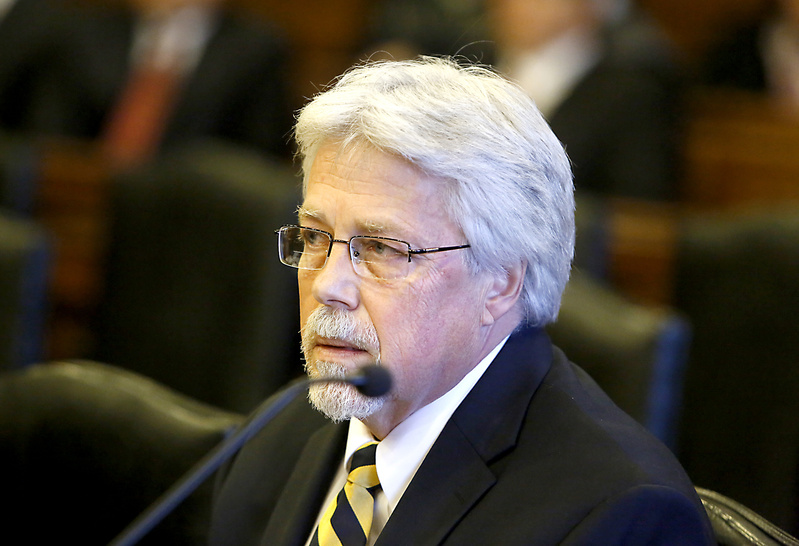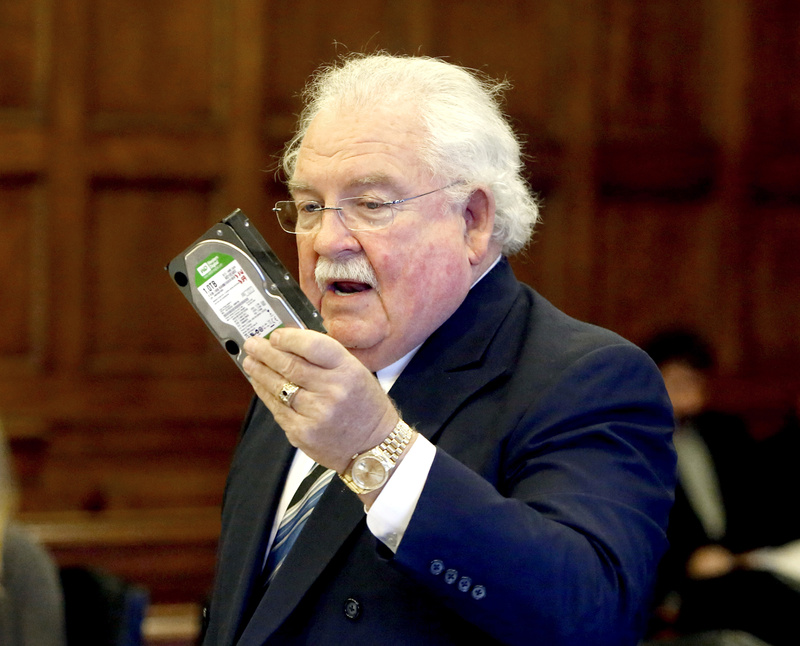PORTLAND — The attorney for Mark Strong Sr. said Wednesday that he will seek sanctions against prosecutors if they cannot back up their assertion that evidence of child pornography was on a computer hard drive that police seized from Strong’s home.
Daniel Lilley made the threat a day after York County Deputy District Attorney Justina McGettigan said in a court proceeding that “markers” of possible child pornography were found on the hard drive taken from Strong’s home in Thomaston during the investigation of an alleged prostitution operation in Kennebunk.
If prosecutors cannot prove that, Lilley said, he will try to have them sanctioned on the grounds “that they’re lying and that they have a hell of a lot more responsibility to keep that to themselves.”
Strong was indicted last week on 59 misdemeanor charges: violation of privacy, promotion of prostitution and conspiracy to commit those crimes. He pleaded not guilty on Tuesday.
Alexis Wright, a Zumba teacher from Wells, faces 106 counts in the case, including offenses related to prostitution, violation of privacy, tax evasion and theft of welfare benefits.
The case has drawn national attention and is being watched closely in southern Maine, largely because the records that Wright allegedly kept on her prostitution clients include more than 150 people, including prominent figures. The list of clients has not been made public, but police have started issuing court summonses to the suspected “johns.”
McGettigan spoke about child pornography Tuesday during an exchange about evidence with Superior Court Justice Nancy Mills.
In explaining why the state was not providing the hard drive to Lilley, McGettigan said there were indications – she did not say what – that there might be child pornography on it.
The state cannot turn it over because of statutes addressing the handling of sexually explicit materials involving minors, the prosecutor said.
Lilley said McGettigan didn’t have to make that assertion in open court and should have called for a sidebar, in which lawyers confer with the judge by the bench.
Lilley questioned why prosecutors hadn’t brought up the possibility of child pornography earlier. He said he was told in person, on the phone and in an email that the state didn’t have anything containing child pornography.
“I’m going to be looking for a retraction or something in the nature of a sanction unless they come up with a charge,” Lilley said Wednesday. “If they did (have evidence), you know damn well they would have indicted (Strong) on it. They’d finally have a charge with some guts to it.”
Assistant Attorney General Gregg Bernstein, the co-prosecutor in the case, said in a letter to the court Sept. 20 that statutes about sexually explicit materials involving minors did not apply in the case.
But McGettigan said in court Tuesday that there had been further “imaging” – a possible reference to copying the contents of a hard drive in a forensically sound way.
McGettigan did not return calls Tuesday or Wednesday. Lt. Anthony Bean Burpee, spokesman for the Kennebunk Police Department, said he could not comment.
Bernstein said the Attorney General’s Office is handling only the tax and public-assistance charges, and referred questions about other matters to the York County District Attorney’s Office.
District Attorney Kathryn Slattery issued a rare press release late Wednesday afternoon, saying her office would not comment on any pending matter, in accordance with state bar rules.
“We want to ensure these defendants have a fair trial, which is in everyone’s interest,” Slattery said in the release. “For now, as District Attorney, I am confident that when all the facts are made public, the evidence will speak for itself and the community will possess a full understanding of what happened.”
It’s not clear what McGettigan meant by “markers,” and Lilley said he doesn’t know what that means.
He said the hard drive was from a computer in Strong’s home that others could access. It was among the items that were seized from Strong’s home and business in July, when he was charged with the initial count of promotion of prostitution. No one else was charged in the case until last week.
Computer forensics experts who aren’t involved in the case said “markers” could refer to a number of indicators, including file names associated with child pornography, a file’s digital “fingerprints” and other traces of activity associated with a file.
If a computer user downloaded a picture named “illegal.jpg,” for example, and saved it into a folder before double-clicking it, two entries would be created, said David McGroty, who works in the forensics division of Flashback Data, based in Austin, Texas. He said there would be a shortcut in the folder and an entry in the program that was used to view it.
Examiners may find indicators but not necessarily the file, McGroty said.
Another computer forensics expert, Wes Goodwin, said it would not surprise him if investigators did not come across indicators of child pornography right away. He said four months is not very long in the context of a criminal case.
Investigators could have run various analyses that didn’t detect anything at first, or the emphasis could have been on looking for different types of files, said Goodwin, who owns Databank Data Services, also based in Austin, Texas.
Also, much of the examination could have involved time-consuming manual searches, he said.
“If the person was destroying evidence or trying to hide it, there’s different types of analyses to detect that. If you detect things, you’ve got to follow up on that,” he said. “You have to reverse engineer what was there versus what was there in the beginning.”
Staff Writer Ann S. Kim can be contacted at 791-6383 or at:
akim@pressherald.com
Twitter: AnnKimPPH
Send questions/comments to the editors.




Success. Please wait for the page to reload. If the page does not reload within 5 seconds, please refresh the page.
Enter your email and password to access comments.
Hi, to comment on stories you must . This profile is in addition to your subscription and website login.
Already have a commenting profile? .
Invalid username/password.
Please check your email to confirm and complete your registration.
Only subscribers are eligible to post comments. Please subscribe or login first for digital access. Here’s why.
Use the form below to reset your password. When you've submitted your account email, we will send an email with a reset code.